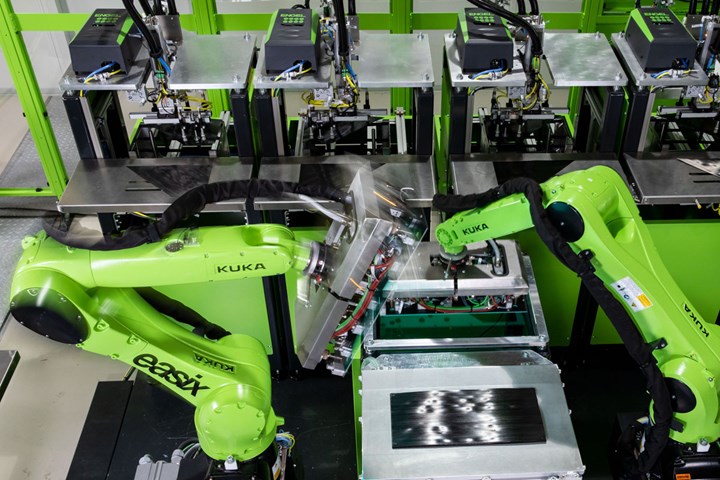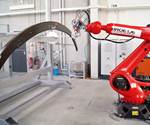Engel, Fill develop automated cell for thermoplastic composites
The system combines a tape-laying cell with a consolidation unit to produce fit-for-purpose blanks with 15-30 tapes in 1-minute intervals.

Source | Engel
Engel Austria (Schwertberg, Austria) and its partner Fill (Gurten, Austria) have announced the development of a production line for the manufacture of thermoplastic composite blanks. To efficiently make the semi-finished products from both glass fiber and carbon fiber-reinforced tapes with a thermoplastic matrix, Engel combined a tape-laying cell with a consolidation unit in an automated production line. Engel says the integrated process can produce fit-for-purpose blanks with 15-30 tapes in 1-minute intervals, for high-volume, cost-effective production.
To achieve the shortest possible cycle times, the tape-laying cell uses a pick-and-place approach. The individual tapes are picked up, visually checked, placed with closed-loop control and then spot-welded together. Since the quality of the resulting stack largely depends on the accuracy of tape positioning, the cell is equipped with a measuring system that uses high-resolution camera technology and two high-speed robots.
In the consolidation process, says Engel, the stack is laid in a tool and then transferred to the heating station via automation. A contact heater and constant consolidation pressure helps the stack achieve a molten state. The stack is then switched to a cooling station to solidify it. Fully automated, this process maintains thickness variations in the laminate to achieve tailored properties. Further, says Engel, because the stacks obtain the shape required for the component during stacking, there is no need for intermediate trimming. Finally, tailor-made blanks can be shaped and injection overmolded — via Engel’s organomelt process — with reinforcement ribs or construction elements to produce ready-to-install parts.
Related Content
-
Eaton developing carbon-reinforced PEKK to replace aluminum in aircraft air ducts
3D printable material will meet ESD, flammability and other requirements to allow for flexible manufacturing of ducts, without tooling needed today.
-
Plant tour: Sekisui Aerospace, Orange City, Iowa, Renton and Sumner, Wash., U.S.
Veteran composites sites use kaizen and innovation culture to expand thermoplastic serial production, 4.0 digitization and new technology for diversified new markets.
-
Update: THOR project for industrialized, recyclable thermoplastic composite tanks for hydrogen storage
A look into the tape/liner materials, LATW/recycling processes, design software and new equipment toward commercialization of Type 4.5 tanks.



